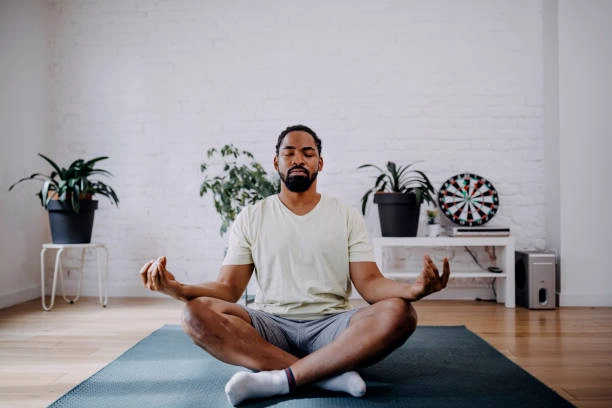The True Way to Calm the Mind, Control Anger, and Relieve Anxiety—Meditation
In recent years, people in some developed Western countries have shown a growing interest in Eastern religions. Due to an emphasis on psychotherapy, meditation—an ancient Eastern practice—has been extensively explored and sparked a wave of learning in the West.
People are gradually realizing that meditation is not an ancient superstition or a practice reserved for hermits, but rather a method similar to psychology for cultivating the mind.
Meditation is one of the essential practices in Buddhism and a traditional method in China for nurturing body and mind, deeply influencing Chinese culture. The core of meditation is “quiet contemplation,” where one attains wisdom through the cultivation and development of the mind, thereby “seeing one’s true nature” and reaching the Buddhist state of “awakening to Nirvana.”
1. Finding the Path to Happiness—The Purpose of Meditation
Everyone seeks a life of happiness, but what constitutes true happiness? How can we pursue reliable and lasting joy? In modern society, people constantly change the pace and direction of life, seeking inner joy and satisfaction. However, happiness based on impermanent things is often short-lived and cannot bring enduring fulfillment.
The purpose of meditation is to find a reliable and lasting happiness. Buddhism holds that all beings possess Buddha-nature, and through practice, one can achieve inner completeness and lasting joy. Meditation helps people find happiness anytime, anywhere, and in any situation, freeing themselves from dissatisfaction, anger, anxiety, and other negative emotions, while gaining inner peace and contentment.

2. Exploring the Source of Happiness—Understanding Our Mind
The mind, also referred to as consciousness, is the central focus in Buddhism and the main area of practice. The mind is like a flowing river, constantly changing from moment to moment, with each thought leading to the next in a continuous cycle. Its essence is clear, reflecting experiences just like a calm lake reflects its surroundings.
Meditation allows us to become familiar with positive states of the mind, such as compassion, patience, calmness, and wisdom, so that we can remain calm and patient when faced with adversity, even responding with compassion. Through meditation, we can restore the mind to its natural clarity, returning to its true nature and finding peace and happiness.
3. Meditation as Mental Training—Uncovering Inner Wisdom
Meditation is a form of mental training. By observing, analyzing, and processing our thoughts and consciousness, we reduce attachment, broaden our minds, and make the mind clearer, more resilient, and tranquil. Meditation helps us become familiar with positive states of mind and gradually eliminate negative emotions while cultivating positive habits, thereby achieving lasting happiness.
The ultimate goal of meditation is enlightenment, awakening the most subtle levels of consciousness and embarking on a journey of intuitive discovery of reality. Through meditation, we can deepen our understanding of reality, improve interpersonal relationships, and experience a fulfilling and joyful life.
4. Meditation Is Not Just Sitting—Common Misunderstandings
Meditation is not merely sitting still, nor is it daydreaming. It is a mental activity aimed at transforming the state of the mind to develop positively. We can practice meditation in daily life, not just while sitting.
Meditation requires honesty with oneself, recognizing the self, and properly dealing with negative emotions and habits, while gradually fostering a positive mindset. Through a progressive process of practice, we gradually shed bad habits, become familiar with positive habits, and achieve inner calm and happiness.

5. Focused Meditation—”Calm Meditation”
Meditation techniques can be categorized into “calm” and “insight.” Calm meditation involves concentrating on a single object without distraction, fostering deep mental stability. Through calm meditation, one can overcome mental restlessness and cultivate profound concentration.
Practicing calm meditation does not require solitary retreat; taking 10-15 minutes each day for regular practice can cultivate concentration. When the mind is no longer scattered and focuses on a single goal, one can experience tranquility, peace, and lasting insight.
6. Analytical Meditation—”Insight Meditation”
Insight meditation involves analysis and understanding, developing discernment and wisdom to ultimately attain awareness of reality. Insight meditation allows us to see the true nature of all things, recognizing their impermanence and the absence of self.
Calm meditation and insight meditation are complementary. By combining both methods, we can unite the mind with the meditation object for the best results. Calm meditation cultivates concentration, while insight meditation develops wisdom. Together, they enhance our meditation, leading to deeper insight and concentration.
Meditation is an effective way to calm the mind, control anger, and relieve anxiety. It helps transform the mind through training, leading to inner peace and lasting happiness.
Whether in sitting meditation or daily life, meditation can be practiced to cultivate a positive mindset, eliminate negative emotions, and find inner contentment and happiness. Through continuous practice and understanding, meditation will guide us toward inner tranquility and wisdom.








